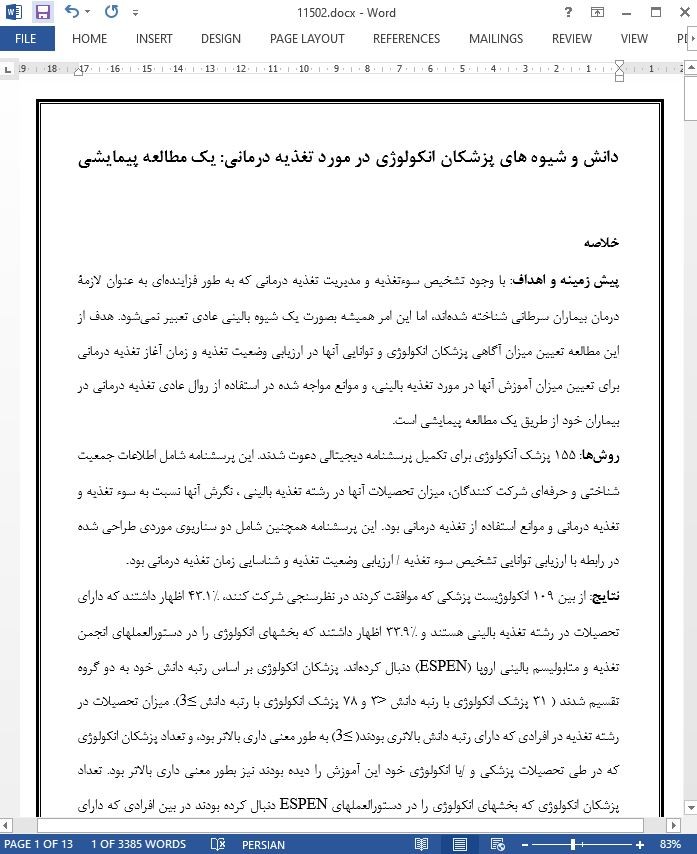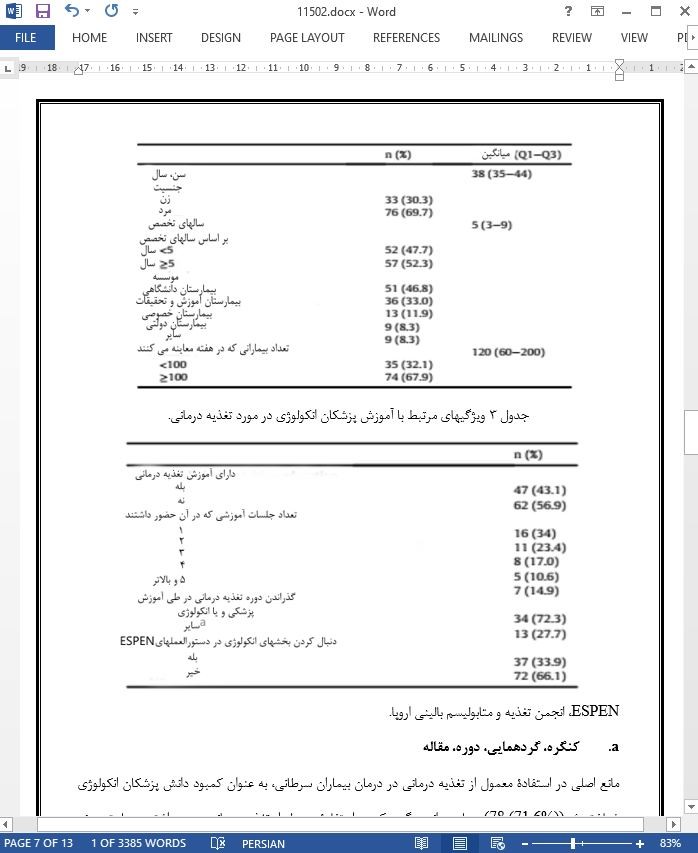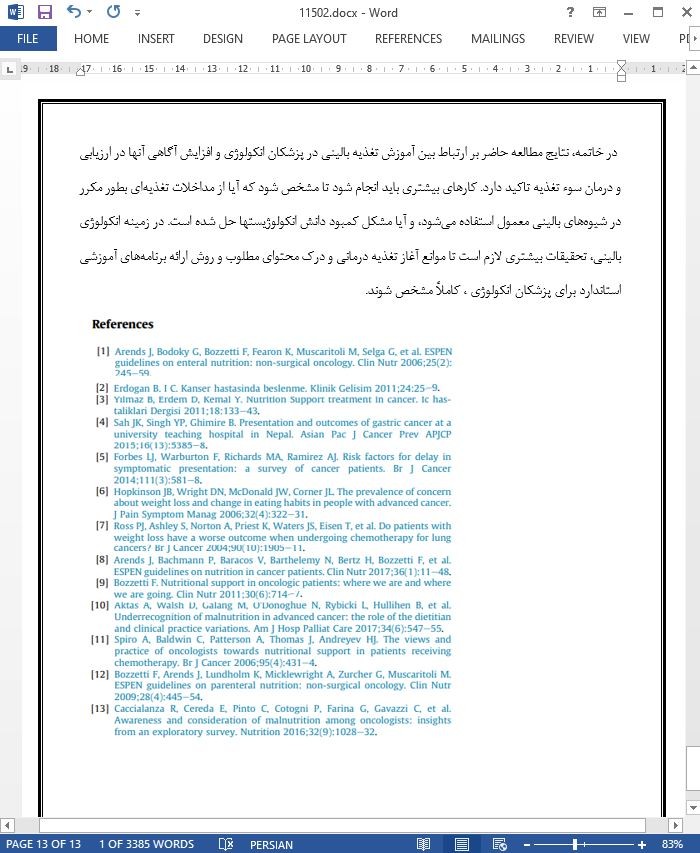
دانش و شیوه های پزشکان انکولوژی در مورد تغذیه درمانی: یک مطالعه پیمایشی
خلاصه
پیش زمینه و اهداف: با وجود تشخیص سوءتغذیه و مدیریت تغذیه درمانی که به طور فزایندهای به عنوان لازمۀ درمان بیماران سرطانی شناخته شدهاند، اما این امر همیشه بصورت یک شیوه بالینی عادی تعبیر نمیشود. هدف از این مطالعه تعیین میزان آگاهی پزشکان انکولوژی و توانایی آنها در ارزیابی وضعیت تغذیه و زمان آغاز تغذیه درمانی برای تعیین میزان آموزش آنها در مورد تغذیه بالینی، و موانع مواجه شده در استفاده از روال عادی تغذیه درمانی در بیماران خود از طریق یک مطالعه پیمایشی است.
روشها: 155 پزشک آنکولوژی برای تکمیل پرسشنامه دیجیتالی دعوت شدند. این پرسشنامه شامل اطلاعات جمعیت شناختی و حرفهای شرکت کنندگان، میزان تحصیلات آنها در رشته تغذیه بالینی ، نگرش آنها نسبت به سوء تغذیه و تغذیه درمانی و موانع استفاده از تغذیه درمانی بود. این پرسشنامه همچنین شامل دو سناریوی موردی طراحی شده در رابطه با ارزیابی توانایی تشخیص سوء تغذیه / ارزیابی وضعیت تغذیه و شناسایی زمان تغذیه درمانی بود.
نتایج: از بین 109 انکولوژیست پزشکی که موافقت کردند در نظرسنجی شرکت کنند، 43.1% اظهار داشتند که دارای تحصیلات در رشته تغذیه بالینی هستند و 33.9% اظهار داشتند که بخشهای انکولوژی را در دستورالعملهای انجمن تغذیه و متابولیسم بالینی اروپا (ESPEN) دنبال کردهاند. پزشکان انکولوژی بر اساس رتبه دانش خود به دو گروه تقسیم شدند ( 31 پزشک انکولوژی با رنبه دانش <3 و 78 پزشک انکولوژی با رتبه دانش 3≤). میزان تحصیلات در رشته تغذیه در افرادی که دارای رتبه دانش بالاتری بودند(3≤ ) به طور معنی داری بالاتر بود، و تعداد پزشکان انکولوژی که در طی تحصیلات پزشکی و /یا انکولوژی خود این آموزش را دیده بودند نیز بطور معنی داری بالاتر بود. تعداد پزشکان انکولوژی که بخشهای انکولوژی را در دستورالعملهای ESPEN دنبال کرده بودند در بین افرادی که دارای رتبه دانش بالاتری بودند، بیشتر بود.
نتیجه گیری: نتایج ما بر رابطه بین تحصیلات تغذیه بالینی و رتبه دانش بالاتر در پزشکان انکولوژی ، تاکید دارد، اما همچنین نشاندهنده ناهماهنگی بین میزان دانش و آگاهی و آنچه در شیوههای بالینی صورت میگیرد، میباشد. تغذیه درمانی میتواند اغلب در زمانی که مسئله عدم دانش کافی در پزشکان انکولوژی حل شده باشد، بصورت شیوههای عادی و روزمره استفاده شود.
4. بحث
مطالعه پیمایشی حاضر، بر روی پزشکان انکولوژی در ترکیه به منظور بررسی وضعيت آموزش تغذیه بالینی در پزشکان انکولوژی، آگاهی و توانایی آنها برای ارزیابی وضعیت تغذیه و تشخیص سوء تغذیه و موانع استفادۀ عادی از تغذیه بالینی در بیماران سرطانی، انجام گرفت.
Summary
Background and aims Despite the identification of malnutrition and administration of nutrition therapy being increasingly recognised as integral to the treatment of cancer patients, this is not always translated into routine clinical practice. The aim of this study was to determine medical oncologists’ awareness of, and ability to assess, nutritional status and when to initiate nutrition therapy, to identify their educational status concerning clinical nutrition and their perceived barriers to the routine use of nutrition therapy in their patients through a survey study.
Methods 155 medical oncologists were invited to complete a digital questionnaire. The questionnaire included information regarding the participants demographic and professional information, clinical nutrition education status, attitudes towards malnutrition and nutrition therapy, and barriers to using nutrition therapy. The questionnaire also included two case scenarios designed to assess ability to diagnose malnutrition/assess nutritional status and identify when nutrition therapy might be indicated.
Results Of 109 medical oncologists who agreed to participate, 43.1% declared that they received clinical nutrition education and 33.9% declared that they followed the oncology sections in the European Society of Clinical Nutrition and Metabolism (ESPEN) Guidelines. The medical oncologists were divided into two groups according to their knowledge score (31 medical oncologists with a knowledge score of <3 and 78 medical oncologists with a knowledge score of ≥3). The rate of having nutrition education was significantly higher in those with a higher knowledge score (≥3) and the rate of medical oncologists having this education during medical and/or oncology education was also significantly higher. The rate of medical oncologists following the oncology sections in the ESPEN guidelines was higher in those with higher knowledge score.
Conclusions Our results emphasize the association between clinical nutrition education and higher knowledge scores in medical oncologists, but reveal a mis-match between knowledge and awareness and what happens in clinical practice. Nutrition therapy might be used more frequently in routine practice when medical oncologists’ lack of knowledge is resolved.
خلاصه
1. مقدمه
2. موضوعات و روشها
2.1. تحلیلهای آماری
3. نتایج
a. کنگره، گردهمایی، دوره، مقاله
4. بحث
4.1. وضعیت آموزش تغذیه بالینی
4.2. آگاهی و توانایی ارزیابی وضعیت تغذیه و تشخیص سوء تغذیه
4.3. نظرات پزشکان انکولوژی در مورد تأثیر وضعیت تغذیهای بر پیش آگهی و دانش مربوط به زمان شروع تغذیه درمانی.
4.4. موانع استفادۀ معمول از تغذیه درمانی
Summary
1. Introduction
2. Materials and methods
2.1. Statistical analyses
2.1. Statistical analyses
4. Discussion
4.1. Clinical nutrition training status
4.2. Awareness of, and ability to assess, nutritional status and identify malnutrition
4.3. Opinions of medical oncologists about the effects of nutritional status on prognosis and knowledge of when to initiate nutrition therapy
4.4. Barriers to routine use of nutrition therapy
- اصل مقاله انگلیسی با فرمت ورد (word) با قابلیت ویرایش
- ترجمه فارسی مقاله با فرمت ورد (word) با قابلیت ویرایش، بدون آرم سایت ای ترجمه
- ترجمه فارسی مقاله با فرمت pdf، بدون آرم سایت ای ترجمه



